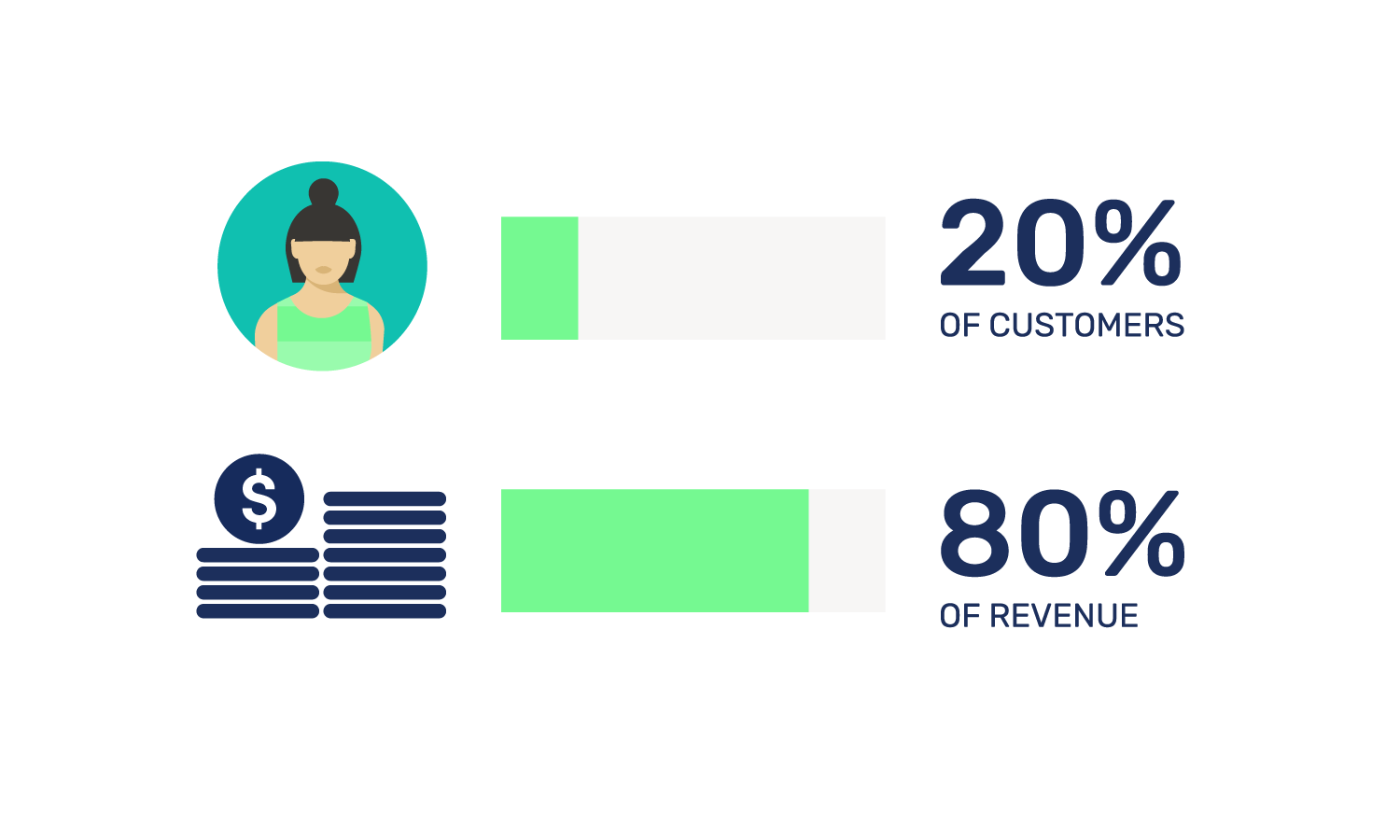Do you sweat when you hear that the holiday season is coming up because your small business has no idea how to compete with all of the big box stores?
Do you worry about how much profit will be left for your company to survive after these sales are done?
Do they cheapen your brand by offering customers a bargain, even if it’s at the expense of your brand’s integrity or dignity? If so, read on.
This article explores what happens in retail during this time of year, why businesses do it, and whether or not these discounts can hurt your branding efforts. It also offers some tips on how to stay competitive without compromising either. We’ll explore how many other companies do it and why.
So. Let’s get started!
What is Black Friday?
Black Friday is the day after Thanksgiving, the biggest shopping day of the year.
Retailers are eager to get customers into their stores to buy merchandise at deep discounts to increase revenue for the quarter.
According to CNBC:
- According to preliminary data from Sensormatic Solutions, Traffic was up 47.5% compared with year-ago levels.
- Online, retailers rang up $8.9 billion in sales on Black Friday, down from the record of about $9 billion spent on the Friday after Thanksgiving Day a year earlier, according to data from Adobe Analytics.
“It’s clear shoppers are shopping earlier this season, just as they did last season,” said Brian Field, senior director of global retail consulting at Sensormatic.
What does this mean?
- It means that people shop early and are looking for great deals.
- It also means that more and more people are surfing the web for online discounts.
- It also means that in-store shopping is still alive and well.
What is Cyber Monday?
Cyber Monday is a marketing phrase used by internet retailers in the United States to encourage people to shop online on the Monday after Thanksgiving.
It was created by businesses to entice consumers to buy online.
Ellen Davis of the National Retail Federation and Scott Silverman, with help from Shop.org, coined the term and announced its introduction on November 28, 2005.
For this article, we will refer to Black Friday and Cyber Monday interchangeably.
Why Do Retailers Do Black Friday Sales?
If you find yourself asking why they do it, you’re not alone. It’s easy to start wondering what this has to do with your small business and its branding efforts.
The reason for the sales is because businesses need to make money.
They have to.
If they don’t, they cannot stay in business.
We live in a capitalistic society where businesses are constantly competing for more customers and making more money. If your company doesn’t find ways to make more money, it will not succeed at all.
I believe Cracked magazine said it best:
So how much do these sales bring in?
“In 2017, Cyber Monday online sales grew to a record of $6.59 billion, compared with $2.98 billion in 2015, and $2.65 billion in 2014. However, the average order value was $128, down slightly from 2014’s $160.
On November 30, 2020, Cyber Monday was the biggest online shopping day in U.S. history with a total of $10.7 billion in online spending.”
Source: Wikipedia
Do Black Friday and Cyber Monday Sales Really Help Small Businesses?
Of course, small businesses can benefit from Black Friday and Cyber Monday sales.
Most Americans who plan on shopping this year will start their search in-store, with the online marketplace only accounting for 41%. More than half (56%) are under 25, and 54% say they’re likely to do so too.
A recent study found that 52 percent of our youngest generation prefers physical stores over virtual ones – even though many millennials rely heavily on digital platforms like Amazon Prime, which gives them access at any time!
But:
52% of Americans said they wouldn’t go shopping on Black Friday, Small Business Saturday, or Cyber Monday.
In comparison, 59% said they are not excited to go shopping on any of the three days, according to a new CNBC/Momentive survey.
This shows that many Americans won’t be marking items off of their shopping list on those three days.
Small businesses can take advantage of this and provide excellent customer service, offer small-batch items not available in stores or at other sites, etc.
This is why marketing your small business to millennials is just as important as reaching out to older generations.
While cyber week sales can generate revenue, small businesses need to think of their customers first.
- Do you provide customer service that makes customers want to come back again and spend more money?
- Do people see your products as ones that are worth the price?
More on that later.
What Do These Sales Do to Your Brand?
Small businesses often complain about how big box stores like Wal-Mart or Target make their deals during this season.
- Do these sales cheapen your brand?
- Do they cause you any problems with your branding efforts during the holiday season?
- Do they make it difficult for you to compete in a market where big brands dominate every corner of the internet and retail?
In a lot of ways, these sales can indeed cause damage to your brand. The problem is that they don’t do this for the reasons you might think. Or at least not only.
Do these sales cheapen your brand?
It depends on who you ask.
- Do your customers think that?
- Do competitors and business owners believe that?
They might.
Big deals like this seem like they’re taking advantage of the consumer, and brands sometimes feel like they’re doing the same thing by giving huge discounts on their products.
Premium brands doing steep Black Friday discounts = lose/lose.
— Nick Efthimiou (@NickEfthimiou) November 27, 2021
Loyal customers feel ripped off for paying full price, newer customers will just wait for future sales.
Don’t cheapen your brand in the long term to make some money in the short term.
Not only does it make you feel as if your brand is cheap, but it gives your customer the feeling that they can get away with demanding more and more from you. They’ll be trained to expect deals like these year-round.
In many ways, Black Friday and Cyber Monday sales cheapen your brand because they show that you’re willing to bend over backward for any low-ball bidder just to make a quick buck as well as another sale.
Of course, not every small business owner wants this; they just don’t know how to turn down a readily available revenue stream that could help them grow.
It isn’t easy, especially since we’ve been raised by society and media to believe that Black Friday and Cyber Monday sales are the only way for anyone to make money this time of year.
Here are some ways that these sales can hurt your small business instead of helping it:
Black Friday/Cyber Monday Sales alienates half of your customer base.
A lot of retail strategies fail to realize that not all customers have equal worth.
A high-value customer has an ongoing relationship with the retailer and continues making purchases throughout the year, while low-value buyers are typically found on Black Friday day; they make only occasional visits or transactions at best–and these purchases tend to be less profitable for retailers than more regular clientele.

Many retailers tend to alienate their high-value customers when participating in or promoting Black Friday/Cyber Monday deals.
This can hurt your brand’s perception in the long run.
So, while having the best Black Friday deals might drive more traffic and revenue for a day or two–those discount days can do lasting damage to your small business’ brand.
Black Friday/Cyber Monday sales are detrimental to your brand.
Small businesses put all their eggs in one basket for Black Friday sales every holiday season, expecting the day to be a huge boon for their business.
However, this is often not the case.
Big retail chains have deep pockets and can afford to run extensive ad campaigns–driving up the number of people who will shop Black Friday.
Or they have ulterior motives:
Smaller businesses are unable to compete with these campaigns, which means less ROI on their investment.
That’s right. Digital marketing is an investment and not an expense.
To make matters worse, some of the biggest retailers start running ads about Black Friday promotions as early as November 1st, ultimately devaluing the entire Black Friday concept for small businesses.
Black Friday/Cyber Monday discounts train your customers to expect discounts.
Retailers may be able to boost their sales temporarily on Black Friday–but is this good for your brand?
Well, it might seem like a boom for business at the time, but when you offer deep discounts on products during that one day–it can significantly discount your brand in the eyes of your customers.
They assume ALL products are discounted at most retailers, and so they hold out for deep discounts. This also devalues your brand because it doesn’t set you apart from the competition–especially since big-box chains tend to dominate most major metropolitan areas.
Focus on providing value year-round.
To truly separate yourself from your competitors–spend less time worrying about Black Friday and Cyber Monday deals and instead focus on creating quality products and services that your customers will love.
You’ll build trust with your community, improve engagement, and ultimately convert casual consumers into loyal ones–who see your brand as the best choice for their needs.
The main thing you want to avoid is getting lost in the crowd of big-box competition, so stay creative and remain consistent with your branding efforts.
Before we go any further. Does your small business need branding? If so, we’d love to help. Visit our logo/branding page for more information.
Use a consistent price strategy.
Your prices should reflect your unique brand value. Do you sell products at the highest possible price, or do you offer more of a discount?
Do you keep your prices consistent year-round? Or do you make them higher during this time and lower them after the holidays are over?
Do not confuse your customers by changing your pricing strategy all willy nilly as some retailers do.
Make it worth their while to pay more for your products and services.
If you want people to notice you, show them, they’ll be getting a better quality product than they would elsewhere if they buy from you.
Small businesses and smaller retailers are at an advantage here.
Consumer habits tend to be different for small businesses since their priority is making sure their customers are happy.
For example, on Black Friday, you can give out coupons or other incentives that encourage repeat purchases or provide discounts for future trips–so your customers feel appreciated year-round.
Remember, customers pay attention to how businesses treat them.
- Do you make them feel like they’re part of the community?
- Do you communicate with them frequently and consistently via email or social media marketing?
- Do you offer perks like loyalty programs or giveaways to your customers who engage with your brand on social media?
If not, then it’s time to start thinking about next year’s Holiday Promotions by asking yourself, “What can I do to make my customers feel appreciated and valued?”
What Do you Do Better Than the Competitors?
It is undeniable that big-box stores have a bigger advertising budget–which means your brand recognition will be less than major retail chains. However, you shouldn’t let the lack of advertising hold you back from gaining customers.
Your brand is worth more than what you can offer in sales and deals for this one day in November and December.
How Do You Do Something Different?
If Black Friday and Cyber Monday sales are not a good idea for your small business, then how do you plan to catch customers’ attention?
It’s a tricky question, but there must be some action you can take to drive in business.
If you have a small marketing budget, it might be best to do something low-key with minimal expenses–like offering free shipping or a small discount for any purchase made during the holiday shopping season.
Do you need some help creating and managing your marketing budget? We can help you get the best return on investment! Visit our digital marketing services page to learn more.
You could always advertise on social media with Facebook ads or Instagram since they are free advertising.
Social media ads are an excellent way to let your customers know that you still care, even if you’re not giving out any incentives.
What Do Other Small Businesses Do?
Before you make a decision, do some research to see what other small businesses are doing.
Use social media, call up your friends in the area, or google how small businesses handle Black Friday and Cyber Monday sales.
Maybe even talk to a few customers so you can see if they have any complaints about big-box stores or if they are loyal to small businesses.
Everyone has their own opinion of big-box stores; for some people, the deal is worth it, while others find that online shopping is more rewarding.
Remember, it’s nice to have a sale or offer perks to get people in the door, but your product or service must live up to the hype in a way that the competition cannot.
One small business owner created a “Not Necessarily the Best Deals” campaign that turned into a huge success.
When customers were asked why they chose to shop at their store over the other retailers, one customer said: “They’re a small business, and I really like supporting those because if you support them, you’re supporting the community.”
Stop Making Your Employees Do All the Promotion for You!
Your employees will be doing most of the talking to customers on Black Friday and Cyber Monday.
That means they need to be as informed as possible or at least know how you would like them to speak about your products and service if it comes up in conversation.
It can’t hurt to give employees some perks for their hard work during the holiday shopping season–like a gift card or having the day off on one of the days known for being busy.
What Do You Do If You Decide to Participate in Black Friday Deals and Cyber Monday Sales?
If Black Friday and Cyber Monday sales are a go for your small business, then get the employees on board.
After all, you’re not just selling to customers–you’re selling to them through your employees too.
Most people enjoy working on Black Friday and Cyber Monday because of the fast-paced environment.
However, if they dread working, then it can be very unproductive for everyone involved.
Ensure that your employees know how you want them to represent your brand–for instance, what kind of language they should use or which topics are safe to discuss.
If You Do Have Employees, Do You Have a Policy in Place?
Even if you’re not allowing your employees to have the day off during Black Friday or Cyber Monday sales, it might be worth putting up a policy, so they know what is expected of them when it comes time for the holiday shopping season.
Check your local state laws and see if some of your employees qualify for paid time off during this time of year.
In addition to having a policy for Black Friday and Cyber Monday sales, you need to make sure that your employees are qualified for the tasks they will be doing.
Some tasks might require additional training or certification since they can help protect you and your employees from being sued.
This goes back to what we said earlier about making your brand worth the hype–customers have to know that you are offering a service or product that is beyond what they can get anywhere else.
What Do You Do If You Decide to Not Participate in Black Friday Deals and Cyber Monday Sales?
Do some damage control.
If you have the type of business where your prices are lowermost months of the year, then offer small discounts during this time.
Do some damage control on your reputation by telling potential customers that the prices they see during this time aren’t going to be permanent and will go back up soon, just a little lower than usual for these extraordinary sales events.
Do be honest with your customers.
Honesty goes a long way.
- Do not claim your products are one thing when they’re actually of lesser quality.
- Do not claim you give them excellent customer service when it’s really just mediocre at best.
- Do not claim to offer the lowest prices in town if you don’t consistently do so year-round, or worse yet, ever!
Be honest with your customers, and you’ll gain their trust and be rewarded with loyalty.
Do not give them false promises, and you’ll keep your integrity and dignity intact, as well as their respect for your product and service offerings.
Use a consistent marketing strategy.
- Do not bombard your customers with commercials, newspaper ads, or social media posts advertising these sales.
- Do not spam people online with loads of ads promoting these deals.
- Do not give them enough discounts to make it seem like you’re practically giving your products away for free!
Consistency is key when it comes to marketing.
People need to know that there’s always something special waiting for them at your store, including great bargains on Black Friday and Cyber Monday.
Do not confuse them by putting out one ad after another telling them what you’re offering; they’ll tune you out and forget about anything special you might have to offer.
Do not let your focus wander from maintaining a consistent marketing plan that works for your small business brand during the rest of the year.
If you need help coming up with a marketing plan, we’re here to help. Complete the form below for a free consultation.
If you have an online store, you have to think about how your store will work for people when shopping during these sales.
Do not forget the importance of having a well-functioning website.
- Do not let it break down on Black Friday or Cyber Monday because so many more people are trying to access it.
- Do not neglect to update your site, make changes to it, or otherwise make sure that your online presence will be strong and thriving for this time of year.
- Do not let cybercriminals attack your website during the biggest shopping day of the year!
Cyber security should be part of any small business’ marketing plan.
If you have an online store, you need to be prepared for the inevitable increase in traffic and sales that come with these two events.
Do everything you can to ensure that your customers have a seamless experience while shopping on Black Friday and Cyber Monday.
Whether you’re offering the biggest tech deals, stocking stuffers, or small appliances, make sure that your customers online and offline will have plenty of reasons to come back and keep shopping at your store.
Does your business need an eCommerce site, or do you have one that needs a little love? Check out our affordable pay-per-month websites that can help you sell your products online (without breaking the bank!)
Do not lose sight of your intended audience or why you started to market in the first place.
If you want a great, sustainable small business brand that is well-respected and profitable over time–and continually growing in value and success–start by building a name for yourself based on honesty, integrity, and consistency.
Do all this while providing your customers with the best possible products and services produced by people who actually care about what they do. Do this year-round, not just during these special small business sales events.
Do all this, and you’ll have a brand to be proud of and enjoy showing off for years to come.
Offer Black Friday and Cyber Monday deals. Just make sure it does not cheapen your small business brand!
Do all the above, and you’ll reap significant rewards through consistency without harming your small business’s brand reputation in the process. Good Luck, Terrific Brands!



